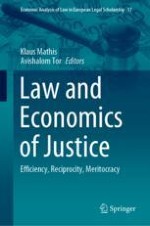2024 | OriginalPaper | Buchkapitel
12. The Consumer Welfare Standard, Consumer Sovereignty, and Reciprocity
An Evolutionary Foundation for the Positive Economic Approach to Law that Actually Works
verfasst von : Fabrizio Esposito
Erschienen in: Law and Economics of Justice
Verlag: Springer Nature Switzerland
Aktivieren Sie unsere intelligente Suche, um passende Fachinhalte oder Patente zu finden.
Wählen Sie Textabschnitte aus um mit Künstlicher Intelligenz passenden Patente zu finden. powered by
Markieren Sie Textabschnitte, um KI-gestützt weitere passende Inhalte zu finden. powered by
